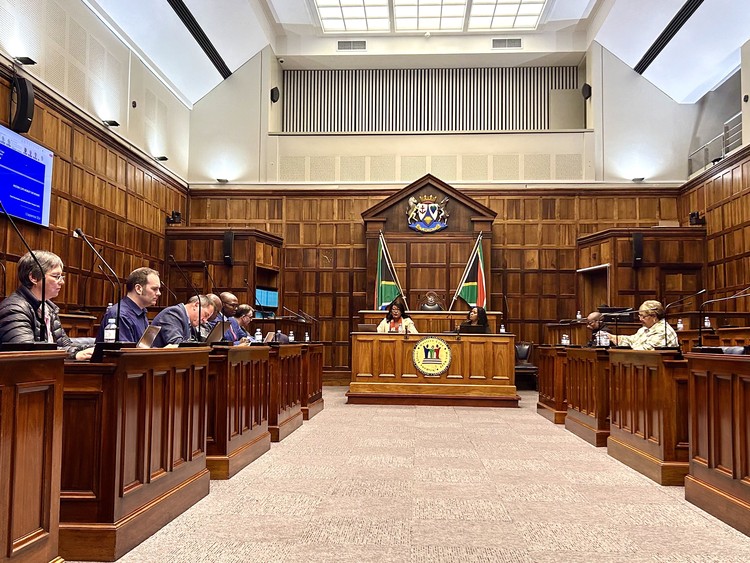Alarming increase in attacks on social workers
“It was a calling for me, but the calling didn’t include me being in danger”
The standing committee on social development in the Western Cape legislature met to discuss the safety of social workers following a spate of attacks. Archive photo: Matthew Hirsch
Attacks on social workers in the Western Cape are on the rise, with seven hijackings, five attempted hijackings, and eight attacks on child and youth care workers over the past year.
Social Development MEC Jaco Londt answered questions about the safety of social workers during a provincial legislature sitting on Thursday.
Last year, GroundUp reported that extortion syndicates were targeting Western Cape Department of Social Development social workers. The Western Cape government asked the justice minister to classify attacks against social workers as an “offence against the state,” with harsher legal consequences. It also called for social workers to be recognised as essential workers.
Londt said if social workers are recognised as essential services, the department could get additional financial support from the National Treasury. He said the department put together a technical paper and working group to discuss the budgetary implications of such a reclassification.
The department also initiated several safety measures since last year, including removing government branding from cars, changing number plates, and sending more than one staff member into hotspot areas.
Hotspot areas for attacks include Khayelitsha, Driftsands, Crossroads, Gugulethu, Wesbank, Mitchells Plain, and sections of the N2 between Spine Road and Mew Way.
Terrence Manase, spokesperson for the Minister of Justice, said: “Attacks on social workers should be treated with the gravity they deserve. The proposal to classify such acts as ‘crimes against the state’ would require thorough legal consideration and possible legislative amendments. But the Ministry supports continued dialogue with law enforcement agencies and provincial governments to explore enhanced protection measures and stronger deterrents,” he said.
Makhaya Jezile, a member of the National Education, Health and Allied Workers’ Union, based in Khayelitsha, agreed with the call for harsher sentences for crimes against social workers. “If you hurt one social worker, you hurt the entire community.”
Jezile has had first-hand experience with extortionists. He was forced to move after criminals demanded a “protection fee” because he parked a government vehicle at his home.
Marina Marco, an auxiliary social worker, said she’s experienced four attacks, including attempted hijackings. She left Khayelitsha to work in Saldanha Bay, which she says is safer. She says she has been been robbed of three cellphones.
Attacks against social workers are “taken too lightly”, said Marco. “It was my choice to become a social worker. It was a calling for me, but the calling didn’t include me being in danger.”
Support independent journalism
Donate using Payfast

Don't miss out on the latest news
We respect your privacy, and promise we won't spam you.
Next: Brainwashed by plastic: the microplastics crisis
Previous: Protesters in Tshwane call on Egypt to let aid into Gaza
© 2025 GroundUp. This article is licensed under a Creative Commons Attribution-NoDerivatives 4.0 International License.
You may republish this article, so long as you credit the authors and GroundUp, and do not change the text. Please include a link back to the original article.
We put an invisible pixel in the article so that we can count traffic to republishers. All analytics tools are solely on our servers. We do not give our logs to any third party. Logs are deleted after two weeks. We do not use any IP address identifying information except to count regional traffic. We are solely interested in counting hits, not tracking users. If you republish, please do not delete the invisible pixel.

